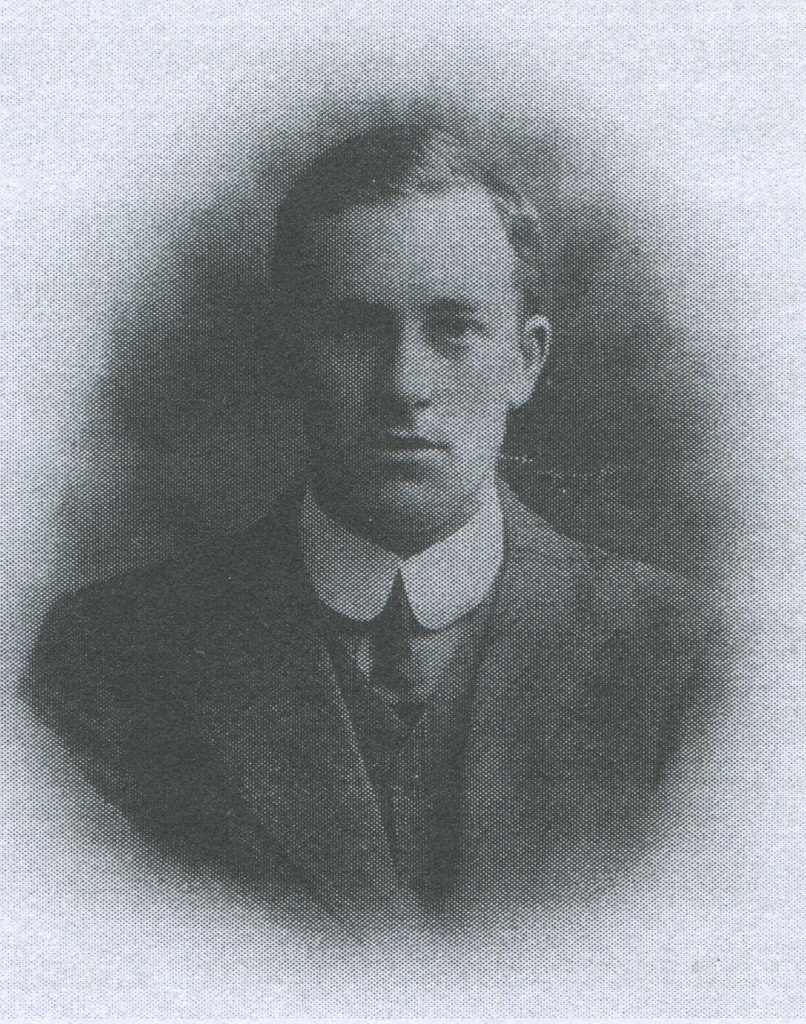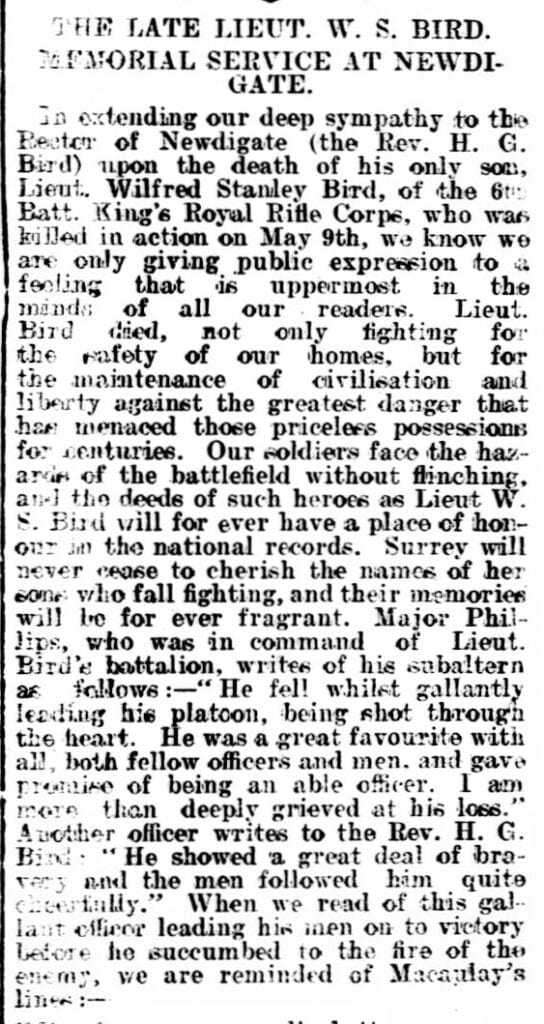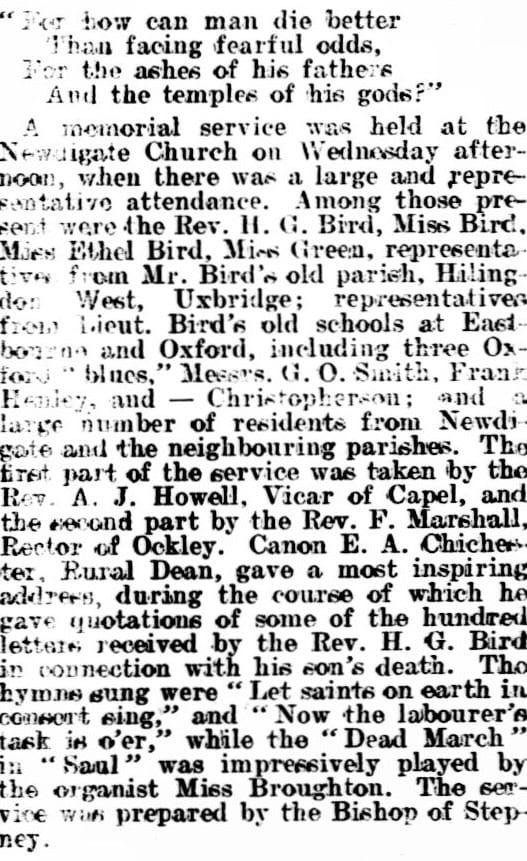
Thank you to John Callcut for letting us reproduce the following information, taken from his book: A Village at War. Newdigate in World War One.
Wilfred Bird was born on the 28th September 1883 at Yiewsley in Middlesex. He was the eldest child of the Rev. Henry G. Bird M.A. and his wife Henrietta Maria (nee Greenham). He had two sisters, Muriel Henrietta (1885-1964) and Ethel Mary (1890-1962) and a brother, Charles Henry Greenham Bird (1887-1919). He was brought up at the Vicarage of St. Andrews in Hillingdon where his father was rector. He was educated at The Grange in Eastbourne and afterwards at Malvern where he was in the cricket eleven from 1900-1902 at the time Canon Sidney James came to be headmaster. He went up to New College, Oxford where he kept wicket in 1904-1906 and was captain in the last year. He kept wicket for the Gentlemen at Lord’s in 1908 and 1912 and played several games for Middlesex. He was an extremely careful and good batsman, but specially excelled as a wicket keeper. One of the best known captains of England said ‘He is the best wicket keeper I ever saw.’ He had been a member of the MCC since 1905. His father became rector of Newdigate in 1913, just a year after his mother had died, and he used to bring teams down to Newdigate to play against the village.
He became a master at Ludgrove School where he was immensely happy and it was a terrific struggle to answer the call, but he never failed to recognise his duty. A member of the Officers Training Corps, he was gazetted to the 5th Battalion of the King’s Royal Rifles on the 29th December 1914.
Wilfred Bird was attached to the 2nd Battalion who on the 9th May 1915 were moved up into reserve from the La Bassee Canal sector. It was planned that a combined French and British attack would capture the strategically important Vimy Ridge. The surrounding area was flat and intersected by drainage ditches, some being too wide to jump. There was little natural cover and it was difficult to see the enemy positions. It was a fine and sunny day after several days of heavy rain, but there was a mist caused by the heat so the attack was duly planned. The battalion consisted of 27 officers and 1000 men. They had tea at 1.30am and rested until 5.00am when a heavy bombardment opened, with field guns firing shrapnel at the German wire and howitzers directing high explosives at the front lines. The bombardment intensified and the K.R.R.C. went over the top facing heavy machine gun fire. At 5.40am the line of fire was lifted by 600 yards and the infantry assault began. They were met by intense cross-fire from the German machine guns which could be seen virtually undamaged in their protective placements. At 6.00am the advance halted with hundreds of men pinned down in no-man’s land, unable to advance or fall back. A report was sent to Brigade H.Q. and a further bombardment was ordered with much effect. Eventually at 7.30am, the battalion received orders to withdraw to the north side of the Rue de Bois. The battalion had four officers killed, Capt. The Hon. E.M.J. Upton, Lieut. W. Hodges, Lieut. W.S. Birdand 2nd Lieut. C.W. Morris, and 42 men killed, plus a total of 123 wounded and 82 missing. On the 12th May, the G.O.C. 2nd Brigade inspected the battalion who received a very complimentary appreciation of their services on the 9th May. His Major wrote of him, ‘Bird was gallantly leading his men when he was shot, and died instantly. Bird was a splendid fellow, and a very promising officer and very popular with officers and men alike. I am more than sorry to lose him.’
Overall the battle had been a total disaster for the British Army, with no ground won and no tactical advantage gained. On that day there were 11,000 British casualties. Wilfred Bird’s body lay somewhere in the mud at Richebourg St. Vaast where he had led the charge across 300 yards of exposed ground. His wrist-watch was found, and returned to his father, and apparently his body was buried because in November 1915 the Rev. H.G. Bird wrote ‘Thank you so much for kindly sending me particulars of the position of my late son’s grave. It is a great comfort to my daughters and myself to know the exact spot which, if I am well enough, I hope I may be able to visit after the war is over.’ It is unknown what happened to the grave because his name, along with many of his comrades who fell that day, is remembered on the Le Touret memorial which records soldiers with no known grave. His name can also be found on memorials at Lord’s and at Uxbridge Cricket Club. A clock was erected in his memory on the cricket pavilion at Ludgrove School, but it was later destroyed when the building was set on fire.

THE LATE LIEUT. W. S. BIRD.
MEMORIAL SERVICE AT NEWDIGATE
In extending our deep sympathy to the Rector of Newdigate (the Rev. H.G. Bird) upon the death of his only son, Lieut. Wilfred Stanley Bird, of the 6th Batt. King’s Royal Rifle Cops, who was killed in action on May 9th, we know we are only giving public interest to a feeling that is uppermost in the minds of all our readers. Lieut. Bird died, not only fighting for the safety of our homes, but for the maintenance of civilisation and liberty against the greatest danger that has menaced those priceless possessions for centuries. Our soldiers face the hazards of the battlefield without flinching, and the deeds of such heroes as Lieut. W. S. Bird will for ever have a place of honour in the national records. Surrey will never cease to cherish the names of her sons who fall fighting, and their memories will be for ever fragrant. Major Phillips, who was in command of of Lieut. Bird’s battalion, writes of his subaltern as follows :- “He fell whilst gallantly leading his platoon, being shot through the heart. He was a great favourite with all, both fellow officers and men, and gave promise of being an able officer. I am more than deeply grieved at his loss.” Another officer writes to the Rev. H. G. Bird. ” He showed a great deal of bravey and the men followed him quite cheerfully.” When we read of this gallant officer leading his men on to victory before he succumbed to the fire of the enemy, we are reminded of Macaulay’s lines:-

“For how can man die better
Than facing fearful odds
For the ashes of his fathers
And the temples of his gods?”
A memorial service was held at the Newdigate Church on Wednesday afternoon, when there was a large and representative attendance. Among those present were the Rev. H. H. Bird, Miss Bird, Miss Ethel Bird, Miss Green representatives from Mr. Bird’s old parish, Hilingdon West, Uxbridge; representatives from Lieut. Bird’s old schools at Eastbourne and Oxfam, including three Oxford “blues” Messrs G. O. Smith, Frank Henley, and Christophersonl and a large number of residents from Newdigate and the neighbourhood parishes. The first part of the service was taken by the Rev. A. J. Howell, Vicar of Capel, and the second part by the Rev. F. Marshall, Rector of Ockley. Canon E. A. Chichester, Rural Dean, gave a most inspiring address, during the course of which he gave quotations of some of the hundred letters received by the Rev. H. G. Bird in connection with his son’s death. The hymns sung were “Let saints on earth in consort sing,” and “Now the labourer’s task is ‘o’er,” while the “Dead March” in “Saul” was impressively played by the organist Miss Broughton. The sermon was prepared by by the Bishop of Stepney.
Wilfred Bird Death Notice 29th May 1915 © Dorking Advertiser findmypast.co.uk
| Born | Yiewsley, Middlesex | |
| Son of | Rev. Henry G. Bird (M.A.) and Henrietta Maria (nee Greenham) Bird | |
| Regiment | 5th Battalion. King’s Royal Rifle Corps. Attd. 2nd Battalion | |
| Date of Death | 9th May 1915 | |
| Place of Death | La Bassee, France | |
| Cause of Death | Killed in action | |
| Age | 31 | |
| Memorial | Le Touret Memorial, France |
Last : William Beadle
Next : Gerard T. Bray

